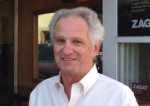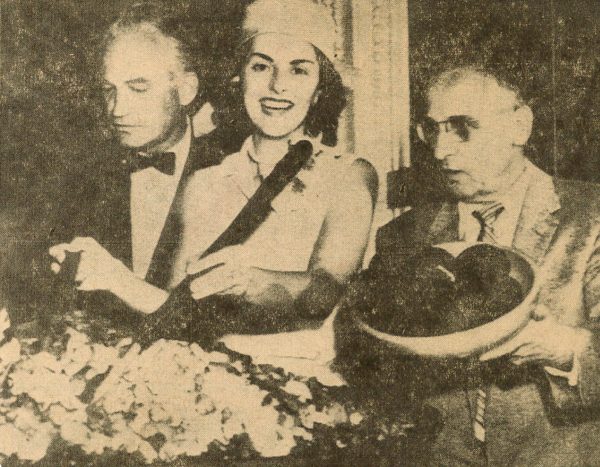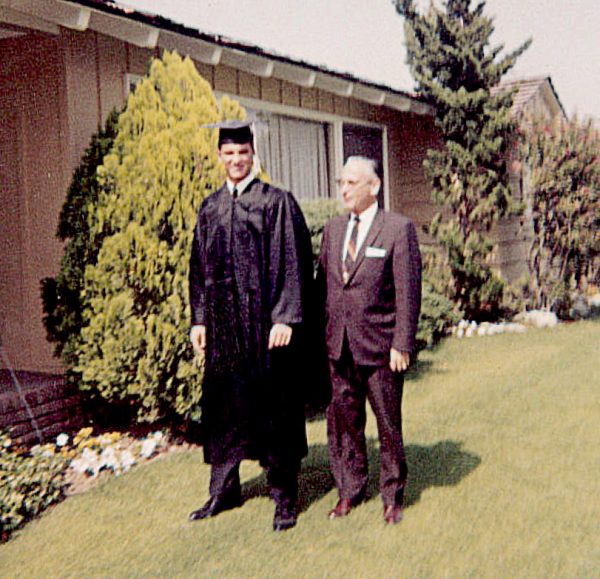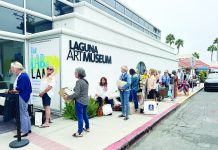Growing Up Utt

I was told at our family reunions that the name Utt was of German origin, perhaps originally spelled “Uthe” when the first of my grandfather’s relatives came here from Germany, right before the Revolutionary War. My ancestors were very proud that our family pre-dated the American Constitution. Wherever our name came from, it was unusual, if not downright odd. It rhymed with “cut,” but most people pronounced it as if it rhymed with “cute.”

From 1953 to 1961, James B. Utt, my grandfather, was Orange County’s only congressman. From 1961 until his death in office in 1970, he was one of only two Congressmen. During this time, his distinctive name had recognition, respect, and power in what has been termed one of the most conservative counties in the nation.
Growing up, whenever my name was read or spoken by someone for the first time, such as the first day of school, Little League signups, Boy Scout meetings, there was almost always the question, “Are you related to Congressman Utt?” This, of course, made the pre-adolescent me feel very special because the people who asked were generally great admirers of my grandfather.
Lisa McGirr’s excellent book, “Suburban Warriors: The Origins of the New American Right,” includes ample references to my grandfather and thousands of middle-class suburbanites organizing themselves into a powerful conservative movement. There were anti-communist reading groups, stop sex education groups, and an explosion of evangelical churches that believed in Biblical inerrancy. I attended such churches in my youth. Well ingrained in the county’s DNA was a xenophobic nationalism, a fear of the “other,” be he dark-skinned or Jewish. This was fertile ground for the John Birch Society, an archconservative organization that was radical in its anti-communism and desire for limited government. The founder, Robert Welch, suggested President Eisenhower could have been a tool of the “communist conspiracy.” They fervently opposed the civil rights movement, alleging that there were too many communists involved in it. The schools even released students early from classes so they could attend Fred Swartz’s “Southern California School of Anti-Communism.”

In the presidential election of 1964, Johnson won the state of California with 60% of the vote. In Orange County, Goldwater got 57% of the vote. In 1968, Fortune Magazine labeled the county “nut country.” This was the district that routinely returned my grandfather to Congress every election cycle. Ms. McGirr tells her story of Orange County, and people like my grandfather, from a scholarly point of view. That was not mine.
As an elementary school student, I ingested, without question, the absolute fear of those my grandfather crusaded against: communists, pinkos, and “other lefties.” I learned that Jews had killed Jesus, and that the Old Testament was righteous, historically accurate, and not to be questioned. Civil rights for Negroes were a dangerous trend and young Martin Luther King Jr. was, very likely, a communist. In the 1960s, my grandfather received an honorary degree from Bob Jones University in South Carolina, an institution of higher learning that almost every Republican presidential candidate visits, and did not allow blacks to enroll until 1971. I did not know about the restriction on enrollment or that interracial dating was forbidden. My grandfather was getting honorary degrees that seemed pretty impressive to me.
More exciting still were the people I got to meet. Walter Knott of Knott’s Berry Farm was a fellow archconservative whom I got to meet several times. One time, my grandfather arranged for me to take a ride on the Disneyland monorail with Walt Disney himself, just the two of us in the front seats. There was also Ronald Reagan, who, before he became governor, would often speak at my grandfather’s campaign rallies. On a trip to Washington in sixth grade, I was introduced to Senator Goldwater and Vice President Richard Nixon. This was all pretty heady stuff for a kid who was yet to sprout his first pimple.
“Why, yes, I am related to the congressman,” I would proudly say. These were the days of hero worship. A picture of my grandfather shaking hands with President Eisenhower hung over my bed. He would send me excerpts of his speeches from The Congressional Record. I would wait up late to see him appear on some local talk shows. I was a true believer and parroted his views.

No discussion of my childhood would be complete without mentioning my father. He was immature, weak, and hurtful. My grandfather knew that his only child would never scale to great heights. I think that my father knew this, too. The only success he had was his dad’s name. One time in Las Vegas, he was drunk and bragged about who his father was. He threatened the casino workers that they better “treat him right.” They took him to the city limits and dumped him in the desert. He was lucky the mob didn’t do worse.
Indeed, it would not be my father, but me whom my grandfather would groom for excellence. As a congressman, he had the power to appoint me to one of the military academies. He hoped that I would wear an officer’s uniform and be another soldier for God and country.
From junior high school through the first three years of high school, my ultra conservatism was my shield, my identity. I had a famous grandfather. I had met important people. I knew the real danger of the communist menace. When assignments or discussions took a political turn, I always took the far right stance. There was one debate where I faced off against an actual liberal Democrat, and a very smart one at that. To the best of my memory he easily bested me and ended his statement with, ”Unfortunately, there will always be people like Jim Utt.” Shaken and mad, I returned to my seat. No one had ever challenged my grandfather’s views to my face before.
It was not a Saul on the road to Damascus moment. It was more a gradual questioning that led to a crumbling of the political ground upon which my grandfather had placed me. In 1963, when I was a sophomore, CBS did an hour-long special entitled, “Case History of a Rumor,” narrated by Roger Mudd. In this hour-long devastation of my grandfather, Mudd reported that Mr. Utt claimed “a large contingent of barefoot Africans” might be training in Georgia as part of a United Nations military exercise to take over the United States.
I began to wonder if my grandfather was a bit too extreme, too much on the fringe. But even after the CBS special, Orange County was still “Utt Country,” and he kept racking up huge electoral victories. The general view was that liberal CBS had done a “hit piece” on the gentleman congressman. The more I learned about his voting record, the more uncomfortable I became with the hero worship I had heaped upon him.
Shortly after the CBS program, I learned that my grandfather had helped write a House minority report that advised voting against admitting Hawaii to the United States. Part of the reason for his position was that Hawaii had “an atmosphere of tolerance, appeasement and encouragement for communism.” I overheard from family discussions that he was also concerned that there were too many non-whites and not enough Christians in this archipelago.
In 1963 and 1964, I witnessed on our scratchy black and white television how Negroes were treated in the South as they marched for basic civil rights: Sheriff “Bull” Connor, police dogs, fire hoses, and jeers by racist thugs. Who could not be moved by such scenes? Yet my grandfather voted against the 1964 Civil Rights Bill, which would outlaw discrimination on the basis of race in public accommodations.
“We have to protect property rights,” he said. He never mentioned human rights.
I remember watching on our scratchy black and white television the March on Washington, where King gave his stirring “I Have A Dream” speech. The only thing I remember my grandfather mentioning from this historical event was that the marchers left a lot of trash behind. There were also rumors of interracial sex, a subject of great concern to him, and to many who lived in Orange County.
In 1965, the nation saw the violence that occurred at the Edmund Pettus Bridge on “bloody Sunday,” as peaceful marchers, supporting the right for black people to vote, were violently set upon by the police. Yet, my grandfather voted against the 1965 Voting Rights Bill. “Too much federal interference in the business that should properly fall to the states,” he said.
By the time I graduated high school, I had decided that the death penalty was wrong. Of course, I kept this view from my grandfather. In 1965, I was in the first class at the University of California at Irvine. The day before classes began, I went to purchase the textbooks. I passed by the magazine rack and saw a cover story: “Mr. Utt’s War with the 20th Century.” I chose not to buy a copy. Instead, I wrote a letter to the editor in which I praised UCI, defended public education, and questioned the wisdom of The Orange County Register. The next time I saw my grandfather, he told me that he could no longer financially support my college education because our views were so divergent.
The Vietnam War raged with increasing intensity as the ‘60s moved on, and I faced the distinct possibility of the draft when I graduated from college. I was an opponent of the war, while my grandfather saw it as a life and death struggle between the free world and communism. His position was similar to that of General Curtis LeMay, George Wallace’s running mate for the American Independent Party. “We should bomb them back to the Stone Age” was their slogan.
I believed that the war poured more and more Americans into the meat grinder that was Vietnam, a war that was only causing misery for all, especially the Vietnamese. By 1968, my grandfather and I stood at opposite ends of the political spectrum. I simply could not believe an elected official could hold such views.

Although he had cut me off financially, we still had contact on occasion. I went over to his house, and the inevitable political discussion began, with my answers only provoking more angry questions. Finally, my grandmother asked, ”Would you even vote for your grandfather?”
I replied, “No, I don’t think so.”
My grandfather, who had been quiet up to this point of the conversation, looked at me coldly and said, “I would rather see you dead and buried in Vietnam than think the way you do.”
My grandfather’s health began to decline around this time. Members of his side of the family put much of the blame on me. “What a betrayal he must have felt when his own grandson turned against him!” “How could he be so ungrateful?” “You know how a broken heart can weaken your health.”
Congressman James B. Utt died in 1970, still in office, the majority thinking that he was doing a fine job. I attended his funeral, which was held at the Crystal Cathedral. Governor Reagan was very gracious to my sisters and me. After the service, a large procession of cars snaked its way through the cemetery. I was in a limo with one of my grandfather’s senior aides. Noticing that the police had closed the freeway for the funeral, the aide turned to me and said, “How nice and respectful. I wouldn’t even mind if they did this for a Negro funeral.”
I am afraid that my grandfather would have agreed with his aide’s comment. While I would always carry the name ‘Utt,’ I will never be the man he was.
James Utt is a retired social science teacher who has lived in Laguna Beach since 2001.





Very interesting time line with the events that were unfolding for that generation, from your perspective.
Some how I missed the 8 year span between high school and university, (1957-1965) were you active in the Peace Corps ?
Great story Mr. Utt. Bet you were a really good teacher.
It is amazing to read your portrayal of your grandfather and compare him to you, Mr. Utt, the man that facilitated so many diverse social and political debates in his Contemporary Issues class. I wonder if you realize how many minds you opened in the county that your grandfather fought so hard to keep closed. You sent your students off into the bigger world ready to question, push back, and engage with peers and superiors. So, on behalf of the many hundreds of students you impacted, thanks for defying your grandfather.
It’s regrettable that those Americans who invite their fellow countrymen to examine the proofs of a conspiracy to destroy the sovereignty of the United States and all nations get ruthlessly ridiculed and mocked. These patriotic people, many of whom are members of the unjustly maligned John Birch Society and who have been disparagingly labeled as “conspiracy theorists,” put evidence on the table that moral cowards, out of a fear of having to stare Satan in the face, pretend to not see.
One such piece of evidence, which hopefully people will have the courage to acknowledge, is a quote from Arnold J. Toynbee, who was a Professor of International History at the London School of Economics. In a June, 1931 paper titled, “World Sovereignty and World Culture: The Trend of International Affairs Since the War,” Toynbee made the following eyebrow-raising admission:
“I will not prophesy. I will merely repeat that we are at present working, discreetly, but with all our might, to wrest this mysterious political force called sovereignty out of the clutches of the local national states of our world. And all the time we are denying with our lips what we are doing with our hands, because to impugn the sovereignty of the local national states of the world is still a heresy for which a statesman or publicist can be perhaps not quite burnt at the stake, but certainly ostracized and discredited.”
I admire the intellectual honesty of this essay and its historical narrative about American political culture in the 1960’s is compelling. Tens of millions of young Americans and their families faced the same ideological schism between the generation coming of age during the Vietnam war, parents from the World War II generation, and grandparents from the World War I generation. It is simplistic to define generations by the wars that were fought during their lifetimes, but in a sense the wars of the 20th century were metaphors for the more complex ideological, political, social, economic, cultural and moral struggles of that century. For example, Vietnam was really as proxy war between the U.S. and the Soviet Union in the context of the decades long strategic rivalry between those two nuclear superpowers known as the Cold War. Just as WWI set the stage for WWII, the advent of nuclear weapons in WWII set the stage for a WWIII that could have ended human civilization as we know it. For the first time an actual all-out military hot war could not be won and mutually assured destruction of both sides made full-scale war unthinkable, though still possible. Vietnam was a surrogate hot war in which 55,000 American military died, and many times that by order of magnitude were killed among our enemy’s forces and civilians in their country. Thus the Cold War was really a global confrontation between the USSR that replaced Nazi Germany as the totalitarian collectivist empire emerging from WWII, and the U.S. as the global leader in the cause of freedom, democracy and equality of human rights. Of course, internationally the Vietnam War proved that the U.S. was neither invincible nor infallible, that our non-nuclear military superiority had its limits in an era of competition between the communist model of government and the democratic model. Domestically, the U.S. also struggled with the anti-democratic tactics of extreme anti-communism, i.e. McCarthyism, as well as the legacy of racial inequality still institutionalized under segregation laws in the southern states. It is in this context that we can begin to understand the story of the Utt family and millions of other families in the 1960’s, when young people nationwide became unable to sustain the contradictions between America’s promise of freedom, equality and justice at home and abroad, on one hand, and our nation’s inability to end historical practices denying freedom, equality and justice domestically and even internationally. The irony was that even at our worst, among all the governments of the world the U.S. was the greatest force for good and for freedom, equality and justice at home and in the community of nations. Yet, because we were confronting the contradictions and fallibility and failures in our own nation’s adherence to the values we hold out to the world, millions of Americans became convinced that America was the most racist, least just, least peaceful nation in the world. The disproportionate burden of leadership in the world led the U.S. to make mistakes and commit wrongs at home and abroad, and Americans became more focused on what was imperfect and wrong than we were on optimistically doing the never ending work the work of becoming a more perfect nation. Many Americans became convinced that the U.S. was causing all the evils present in the U.S. and around the world. The extreme anti-communism and racism that were part of the story of Congressman Utt were expressions of anachronistic and hypocritical attitudes that Americans had tolerated for too long and were exposed as wrong and unsustainable in the 1960’s. Those attitudes were held by an increasingly smaller percentage of the people in America, which made those public figures like Utt seem not only out of step with the times, but almost sinister and evil. It is true that during its transition from a rural to urban region Orange County became home to a high percentage of new residents who shared Utt’s fierce anti-communist opinions, as well as race based fear and even hatred for non-white people in America. Growing up here in the 1960’s, and spednign time in South Pasadena where we also had a home, I was aware of the attitudes and beliefs of people in Laguna Beach and Orange County that were extreme and anti-social, in some cases wrong and even evil. Unlike Utt’s grandson, I was raised in Laguna Beach in a conservative Republican family that supported President Eisenhower’s more mainstream and strategic but ideologically restrained anti-communism, grounded in confidence that the U.S. could compete and win the Cold War. As for race relations, on my father’s side we came from Connecticut yankee abolitionists and my mother’s grandfather was a Union officer killed in the Civil War battle at Fredericksburg, Virginia fighting to preserve and redeem the Constitution’s promise of a more perfect union based on consent of the governed. With the same honesty as Congressman Utt’s grandson I can tell you I never heard any adult in our home speak disparagingly of any person based on race or religion. My father’s family had migrated to Chicago before coming to Laguna, and had acquired a midwest value system that did not include intolerance based on cultural traits such as race or faith. So when the counter-cultural revolution came along in the 1960’s I did not experience the rift between the values of adults in my family and my own generation’s values that Congressman Utt’s grandson endured, and had to rise up from to become his own man. But I know how hard it was for him to do so, and I admire him for it. He had to sacrifice emotionally the tight bond of family as well as the financial support to chart his own destiny. I was more fortunate, we had heated family arguments over Vietnam, and I became a Democrat – in part just to watch my father’s reaction! My grandfather and Uncle Bob were not to happy with me either. But my parents supported Dr. Martin Luther King and desegregation, and for the first ten years of my life I thought Uncle Carl was my real uncle, even though he was a Filipino! His wife Velma was a white woman, and they were my family’s closest friends, so this wonderful friendly brown man had always been Uncle Carl to me, until I got old enough to realize he couldn’t actually be my uncle biologically, even though that didn’t change anything at all. So I never experienced the full-blown ideological alienation and perhaps even racial guilt that Congressman Utt’s grandson had to overcome to be a free man. Again, I admire his honest and fair family story, which rings very true to his contemporaries. That said, I also write this comment not to praise his grandfather and his father, both of who in some way fell short of our best values, but also not to define them only by their worst moments and least admirable traits. Let us not forget that the WWI and WWII generation of Americans saved the world from a new highly industrialized era of tyranny and enslavement like the world had never imagined possible, and thereby prevented not only the loss of our American way of life but life in a world of global dictatorships sustained by genocidal cult regimes. We had the freedom to protest the Vietnam War and demand an end to legalized racial segregation because our fathers and grandfathers defeated the German aggression in WWI and the axis imperial powers of Germany, Japan and Italy in WWII. After winning two world wars, the Cold War threat of losing to communism by subversion within was for many patriotic Americans like facing an invisible enemy you could not fight, and that fear drove many to extreme anti-communism that in turn led to the very denial of freedom that people like Congressman Utt feared with such dread. Yet, I recall that in 1989-1991 I was a treaty negotiator and diplomat in the U.S. State Department, flying in White House jets to Budapest, Warsaw, Bucharest, Moscow and the capitals of all the Republics emerging from the collapse of the Soviet Union. My assignment was to reach agreement on treaties normalizing economic and trade relations between the U.S. and each former communist nation embracing democracy and private property based market economics. Looking out across Russia from our plane as we rose above St. Petersburg the thought struck me that my generation had been right in standing up against denial of rights that preserve our freedom at the hands of strident, strutting anti-communist extremists in the 1950’s and 1960’s. At the same time, I realized that in our own stridency opposing McCarthyism and the un-Americanism of the Congressional hearings by the Committee on Un-American Activities, we had failed to grasp an objective historical truism, which was that totalitarian communism dictatorships that were our enemies in the Cold War were a greater ultimate threat to our freedom and a greater evil that the domestic anti-communist extremism we so vociferously struggled against and condemned here at home. That does not mean Congressman Utt was right for red-baiting or that McCarthyism and blacklisting were not a threat from within that ultimately could have led to loss of freedom and even fascism in America if not stopped. But it does perhaps enable us to recognize that many in the WWII generation that defeated Nazi Germany saw the Soviet Union as the successor threat of a modern military industrial totalitarian dictatorship, and they did not know better how to fight it and stop it as they had Hitler because it was seen as subversion from within rather than conventional warfare coming from across the ocean. They felt like the invasion was already underway, and that there was a commie around every corner. It was political paranoia in some sense, perhaps, but it was not without some validity, and even though our government’s counter-measures proved effective over time, for men like Congressman Utt the issue seemed in considerable doubt. As someone who openly opposed anti-communist extremism even more passionately than I feared communism itself, because McCarthyism seemed the closer to home and more immediate threat to my freedom, as someone who became an expert on the play “The Crucible” depicting the paranoia of hystrical anti-communism, I abhorred the ideological excesses of Congressman Utt. Yet, it meant a lot to me that he got his grandson a ride with Walt Disney, that like me he got to go to Knott’s Berry Farm when it was a berry farm, and that despite his misguided but sincere extremism he did is best for his family and country as he saw it. If nothing else, he raised a grandson who had the character to realize his seemingly invincible grandpa was wrong and stand up to him, accept the consequences and become a voice of truth in our community. Somehow, not matter how different I am, I saw in Congressman Utt as described in between the lines as a flawed and fallible man who reflected much of the good as well as some of what was very wrong in the beliefs of his generation of Americans.
Thank you for sharing your experience with an Orange County many of us do not know. Such a contrast to current OC’s political and cultural diversity and an important story to be told. Would love to hear more stories!
Thank you for another exceptional piece of writing. Once again, your integrity and intelligence come through. Through the lens of your your story, I find myself left with a deeper understanding and appreciation of those vital decades of not only Californian, but American history. I would love to read more in this vein, more of this deeply personal story set against the social and political changes that some moved forward with and that some were left behind by. Well done.
This piece is so relevant to our headlines today. History does repeat itself. Thank you for sharing your journey with your grandfather. It’s brave of you to do so.
My grand parents moved to OC in 1911. I meet Congressman Utt for the first time in 1962. I think I can give some information on the issue
of Hawai’i. The Congressman had a concern that Hawaiian was one of the
official languages of the Territory and thought it should only be English. Having attended the University of Hawai’i, I agree that
Hawai’i was a place with a high concentration of Reds.
I still recall my last talk with the Congressman over the issue of
Wrangell Island in the Arctic Ocean, an island where the Soviet Navy
did an Act of Piracy on the Territory of Alaska between August 20 –
24, 1924, viz., kidnapped 14 persons (13 Eskimos & 1 White Man) and
deported them to Siberia.
Wrangell Island was annexed by the U.S. Government on August 12, 1881
under the name New Columbia Land. On May 17, 1884, it was added to the
District of Alaska. On June 29, 1901, the name was set as Wrangell Island, by resolution of the United States Board of Geographic Names.
On August 23, 1912, the District of Alaska was upgraded to an incorporated and organized Territory of the United States by the name
Territory of Alaska.
James Utt should be credited with giving Alaska statehood first, before
Hawai’i. His concern about Communist activities in Hawai’i got statehood for Hawai’i delayed so Alaska came in as the 49th State before Hawai’i.
Sincerely, Mark Seidenberg, Chairman, American Independent Party of
California
Look what was taking place in Alaska at the time of the events in Georgia that your grandfather wrote about in his news letter about “Exercise Water Moccasin III” in November, 1963. We had a Kennedy administration that allowed Soviet Troops or personal to occupy three Alaskan Islands, viz., Wrangell, Henrietta, and Copper Islands.
Utt was getting no answers back from the Executive Branch that was truthful. Castro was training insurgents to East Africa trained in
Cuba. Look what happened in Zanzibar a few months latter. The Sultan
was overthrown and moved to England.
Mr. Utt was my favorite teacher from high school. I have many fond memories of him and his classes. Mr. Utt encouraged dialogue in the Socratic method. I am very thankful for him and the way he taught us.